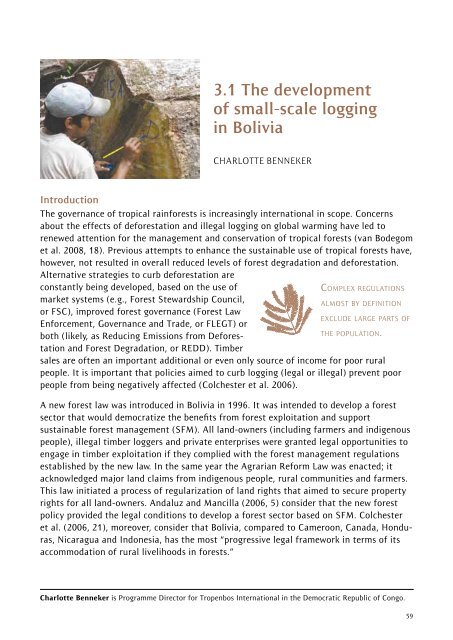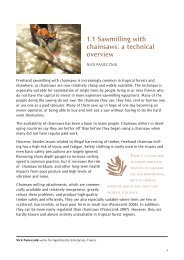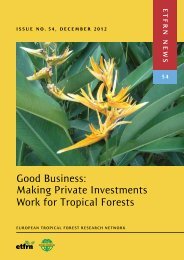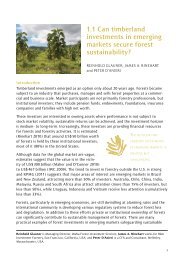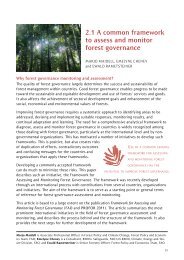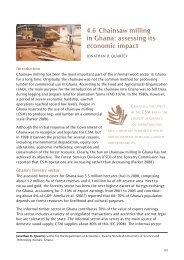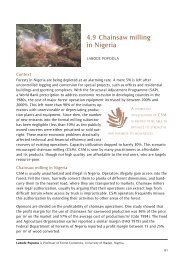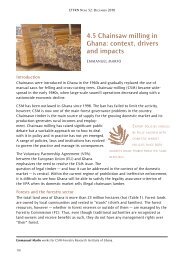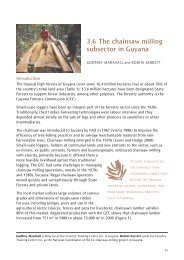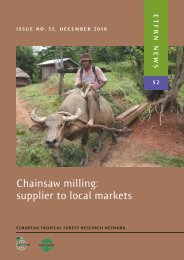Chainsaw milling: supplier to local markets - European Tropical ...
Chainsaw milling: supplier to local markets - European Tropical ...
Chainsaw milling: supplier to local markets - European Tropical ...
You also want an ePaper? Increase the reach of your titles
YUMPU automatically turns print PDFs into web optimized ePapers that Google loves.
3.1 The development<br />
of small-scale logging<br />
in Bolivia<br />
CHARLOTTE BENNEKER<br />
introduction<br />
The governance of tropical rainforests is increasingly international in scope. Concerns<br />
about the effects of deforestation and illegal logging on global warming have led <strong>to</strong><br />
renewed attention for the management and conservation of tropical forests (van bodegom<br />
et al. 2008, 18). previous attempts <strong>to</strong> enhance the sustainable use of tropical forests have,<br />
however, not resulted in overall reduced levels of forest degradation and deforestation.<br />
alternative strategies <strong>to</strong> curb deforestation are<br />
constantly being developed, based on the use of<br />
complex regulaTions<br />
market systems (e.g., Forest stewardship Council,<br />
almosT by definiTion<br />
or FsC), improved forest governance (Forest law<br />
exclude large parTs of<br />
Enforcement, Governance and Trade, or FlEGT) or<br />
both (likely, as reducing Emissions from Defores-<br />
The populaTion.<br />
tation and Forest Degradation, or rEDD). Timber<br />
sales are often an important additional or even only source of income for poor rural<br />
people. it is important that policies aimed <strong>to</strong> curb logging (legal or illegal) prevent poor<br />
people from being negatively affected (Colchester et al. 2006).<br />
a new forest law was introduced in bolivia in 1996. it was intended <strong>to</strong> develop a forest<br />
sec<strong>to</strong>r that would democratize the benefits from forest exploitation and support<br />
sustainable forest management (sFm). all land-owners (including farmers and indigenous<br />
people), illegal timber loggers and private enterprises were granted legal opportunities <strong>to</strong><br />
engage in timber exploitation if they complied with the forest management regulations<br />
established by the new law. in the same year the agrarian reform law was enacted; it<br />
acknowledged major land claims from indigenous people, rural communities and farmers.<br />
This law initiated a process of regularization of land rights that aimed <strong>to</strong> secure property<br />
rights for all land-owners. andaluz and mancilla (2006, 5) consider that the new forest<br />
policy provided the legal conditions <strong>to</strong> develop a forest sec<strong>to</strong>r based on sFm. Colchester<br />
et al. (2006, 21), moreover, consider that bolivia, compared <strong>to</strong> Cameroon, Canada, honduras,<br />
nicaragua and indonesia, has the most “progressive legal framework in terms of its<br />
accommodation of rural livelihoods in forests.”<br />
charlotte benneker is programme Direc<strong>to</strong>r for Tropenbos international in the Democratic republic of Congo.<br />
59


